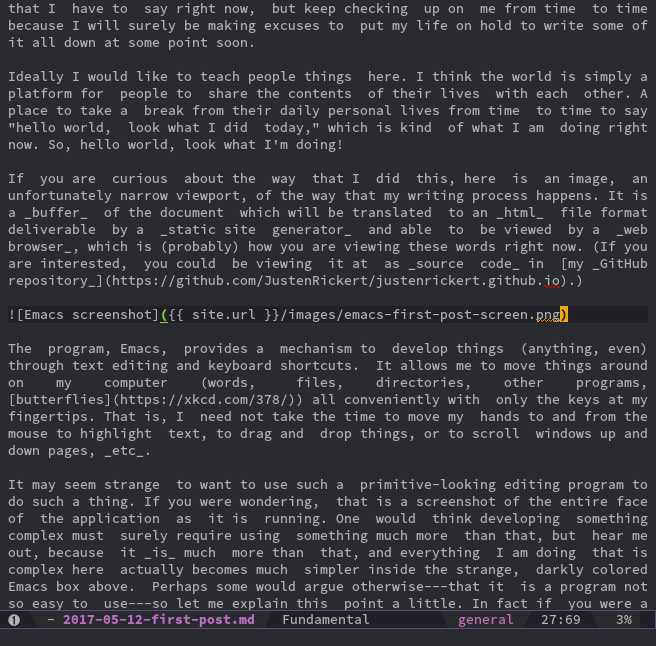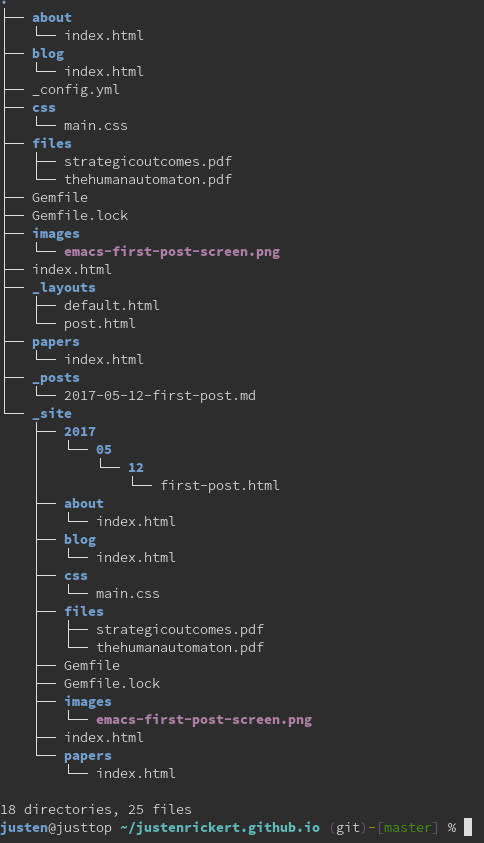Hello, world! Obligatory thanks for checking out my blog. There is not a lot that I have to say right now, but keep checking up on me from time to time because I will surely be making excuses to put my life on hold to write some of it all down at some point soon.
Ideally I would like to teach people things here. I think the world is simply a platform for people to share the contents of their lives with each other. A place to take a break from their daily personal lives from time to time to say “hello world, look what I did today,” which is kind of what I am doing right now. So, hello world, look what I’m doing!
If you are curious about the way that I did this, here is an image, an unfortunately narrow viewport, of the way that my writing process happens. It is a buffer of the document which will be translated to an html file format deliverable by a static site generator and able to be viewed by a web browser, which is (probably) how you are viewing these words right now. (If you are interested, you could be viewing it at as source code in my GitHub repository.)

The program, Emacs, provides a mechanism to develop things (anything, even) through text editing and keyboard shortcuts. It allows me to move things around on my computer (words, files, directories, other programs, butterflies) all conveniently with only the keys at my fingertips. That is, I need not take the time to move my hands to and from the mouse to highlight text, to drag and drop things, or to scroll windows up and down pages, etc.
eas·y / ˈēzē/ adjective
achieved without great effort; presenting few difficulties. “an easy way of retrieving information”
It may seem strange to want to use such a primitive-looking editing program to do such a thing. If you were wondering, that is a screenshot of the entire face of the application as it is running. One would think developing something complex must surely require using something much more than that, but hear me out, because it is much more than that, and everything I am doing that is complex here actually becomes much simpler inside the strange, darkly colored Emacs box above. Perhaps some would argue otherwise—that it is a program not so easy to use—so let me explain this point a little. In fact if you were a keen observer, you will have noticed that I am not using the Emacs mode to edit the markdown format text, and that is because I cannot get it to work at the moment! It must not be so easy if I cannot figure it out, after all.
sim·ple / ˈsimpəl/ adjective
composed of a single element; not compound.
Rich Hickey, a programmer made popular by his designing the programming language Clojure, is well know for a presentation he gave on the language titled Simple Made Easy. In the presentation he contrasted the difference between the words simple and easy, emphasizing simplicity’s virtues over easiness’. The takeaway is this:
Simple is often erroneously mistaken for easy. Easy means "to be at hand", "to be approachable". Simple is the opposite of complex which means "being intertwined," "being tied together." Simple is not the same as easy.
The comparison I am making here is that the fashion I have found to develop
things on my computer (like this blog) was not easy to figure out. When I run
the tree command on the source directory I am met with an amalgam of different
kinds of information. The source directory of the blog contains 18 directories
containing 25 different files needing managing somehow. That goes without
mentioning their depending upon an understanding
of Jekyll
and GitHub Pages.

When I do the same command on the directory containing all of the work that I have done in the last year of school, the command returns that there exists 97 directories containing 616 files. Doing the wc command tells me that there are 229,729 words contained in just the org file format alone! Clearly, this is complex. Upon viewing such a system one need ask the question “How does one simplify this?” Surely, finding a such a simplification could not be easy.
In any case, before even beginning to consider what steps need be taken to figure out how the system even works, one needs to learn how to be productive inside of it. Perhaps second to that is a need to make oneself feel at home working inside such a complexity. My proposition is that my program of choice is the means by which I simplify the works in the life; though such movements may not be easy, it should not be that the works in the end are too complex—rather, they should be simple. I am an intrepid explorer of informational networks, intertwined strings of processed text inseparable according their associated file format’s parsing algorithms, and am clothed in my Spacemacs spacesuit, ready to try my hand at making simple the not-so-easy task of programming. However, I truly wish only to inspire and motivate those around me to try to be the same.